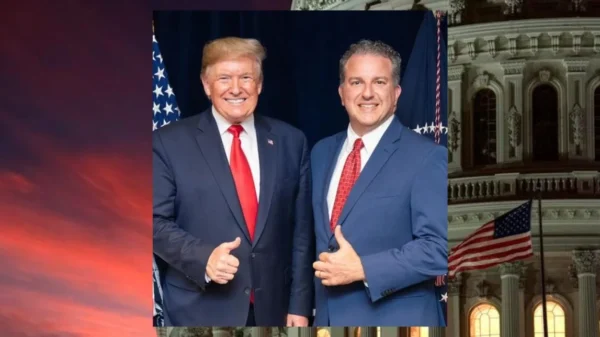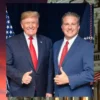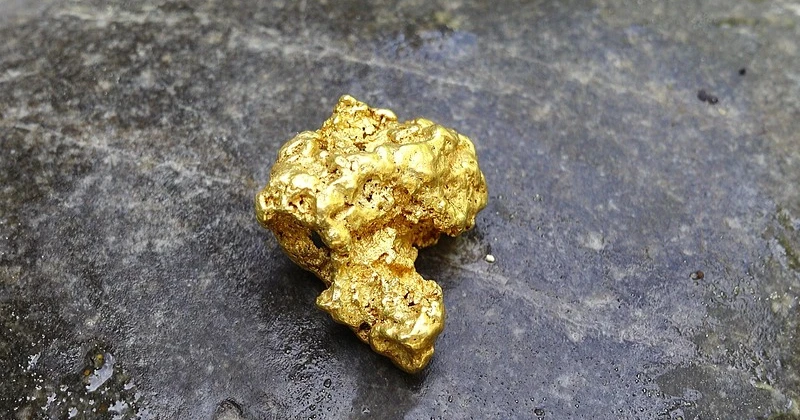This week, Florida Chief Financial Officer (CFO) Jimmy Patronis spoke at the the 95th Annual Florida Future Farms of America (FFA) Convention in Orlando.
Patronis said the following:
Good evening!
It’s an honor to be at the Opening Session of the 95th Annual Florida Future Farmers of America Convention.
Before I get too far into tonight’s conversation, there are a few people I want to recognize.
First is Wilton Simpson, Florida’s Commissioner of Agriculture.
Commissioner, it’s nice having someone who knows something about agriculture finally running this office.
Representative Chuck Brannon is here. He’s been a big champion of agricultural causes in our state.
Anelise Bullard, the FFA State President is also here.
Congrats on becoming President. I know it took a lot of work.
Before I get into some of the things I wanted to talk about tonight, I know many of you have some questions.
Like, who is this guy and how long do I have to sit here?
The answer is I don’t know.
Like a lot of the papers you wrote in school, I asked ChatGPT to write this speech, and this is my first time reading it.
So for better, or worse, we’re on this journey together.
My name is Jimmy Patronis, and I am the state’s Chief Financial Officer.
Just like the Commissioner, I am elected every four years and I manage the state’s finances.
Serving as the state’s CFO means that when the State of Florida pays for something, my name is on the check.
I am also the State Fire Marshal.
My office does a lot more, but luckily for everyone, I’m not here to give a lesson about Florida Government.
Tonight, is about you, not me.
Unlike most people here, I don’t have much of a green thumb, but my family does have a tree farm in north Bay County.
In fact we were the Tree Farmer of the Year once.
But for the most part my family has been in the restaurant business my entire life.
My family runs an 800-seat restaurant in Panama City.
My daddy started it over 50 years ago and we’ve kept the family business going.
I can’t imagine how many heads of lettuce, tomatoes, cucumbers, and potatoes I’ve cut up, diced, and served.
I’ve never done the math on how much flour and rice we’ve gone through.
And I’ve got no clue how many gallons of milk I’ve used, or how much sugar, and fruits, have gone into our desserts.
All I can tell you is that the only way we can do our job is if Florida farmers are able to do theirs.
The way food shows up on trucks, and store shelves, is something people take for granted.
There’s no denying that quality fruits, vegetables and meats are what often separate good restaurants from the others.
My love of agriculture also comes from my official position as state CFO.
Everyone here understands how agriculture plays a critical role in Florida’s economy.
Jobs in agriculture represent over 17% of the state’s workforce, which is over 1.4 million people, that’s more than the entire state of South Dakota.
In fact, agriculture is the second largest economic driver in the state of Florida just behind tourism. That’s about $129 billion in economic output.
I’m a big people-person and I love huge gatherings like this one.
This convention is going to be a great place for you to connect with people in your field.
I’m someone who learns by talking to people, so I’m hoping to learn more from everyone about what we need to do to make things easier for farmers, ranchers, and agricultural entrepreneurs.
So, if you would oblige me, let’s do a quick poll.
Who wishes the federal government would play a bigger role in how you farm?
Who here thinks Washington DC helps make American farming better?
Now, who thinks we need less government, and we need to leave the farming up to the farmers?
The reason I was asking everyone what they thought about government regulation, is because I think all of America went through a watershed moment with the coronavirus.
Before COVID, there was a narrative that government made things safer.
Then we all went through the government’s response to COVID, and saw how the appointed experts did not have all the answers.
They said we need to shut down.
They said the masks worked.
They said if you got vaccinated you wouldn’t transfer the virus.
They said there’s no way this virus came from China.
They were all wrong.
They didn’t know what they were talking about – and we paid a price for it.
So, when I think about COVID I think about how other industries are regulated – like agriculture.
If it weren’t for all the rules and regulations – farming would be very different.
It would probably save a lot of time and energy too.
Take milk for example…
There is a developing market for unpasteurized milk, or “raw milk.”
If you travel to farmers markets across the state, you can buy it.
It may be labeled as “pet milk,” but people are drinking it because consumers are becoming more wary of what’s being added to their foods.
The reason people are drinking “pet milk” is because of federal rules that have been on the books since the 80s.
Now I don’t have enough expertise to say whether any of it is good or bad, but after seeing what the “experts” told us after COVID, it’s making me rethink a lot of my preconceived notions.
The fact is we don’t make life easy on farmers trying to make a living.
There are so many rules they have to follow, and in the post-COVID era, there’s an opportunity to look at the regulations that have been on the books for decades, and find opportunities to let farmers farm without so much red tape.
The second question I have is where did this global movement to shutdown farms come from?
More importantly: is there a war against farmers brewing?
Take Western Europe for example…
The Dutch export about $130 billion in agricultural exports and the EU is about to pay farmers over $1 billion to not to farm.
The reasoning is that it’s good for the environment; that it will help them reduce nitrogen.
Now I am the most pro-environment CFO there has ever been.
My family’s livelihood depends on the turquoise waters of the Gulf of Mexico.
The BP oil spill was a terrible tragedy for the Panhandle.
But when you have a profitable industry, and your country is coming up with ways to shut it down?
That does not make sense to me.
The future will be filled with more people, and all those people will eat.
(By the way, the Dutch farmers didn’t like any of this.)
They protested with tractors and were labeled Right Wing extremists.
I can’t think of anything better for the environment than farming.
It’s the one job that ties people directly to the Earth.
To me, any effort to shutdown farming is more anti-human than pro-environment.
That leads me to my third question: how are we supposed to feed everyone in the coming decades?
Projections show that we’re going to have to feed over 9 billion people by 2050, which will require a 70 percent increase in agricultural output.
When I saw that number, I said to myself “now it makes sense why people like Bill Gates, and why countries like the Communist Party of China, are trying to buy up so much American farmland.”
If you want to control people, do you really need guns or bombs, when you own their food supply?
We’ve got around 1,000 people a day moving to Florida.
They’re leaving failed states like New York, Illinois, and California.
Anyone who’s driven through Central Florida has seen pastures and citrus groves that are being converted into suburbs.
That’s why as a member of the Florida Cabinet we’ve worked hard to protect these lands and ensure that future generations of farmers and ranchers can continue to practice agriculture throughout the state for years to come.
In fact, in the last meeting of the Cabinet, we’ve protected the right to farm in the state by investing $60 million to retain farm lands in our state.
Since I took office in 2017, the state of Florida has acquired almost 200,000 acres of state lands totaling $400 million which promotes and secures agricultural practices by allowing farmers and ranchers to conduct their business with little to no tax burden.
But we do need to think deeply about how we’re going to feed more people, with less acreage.
So, when Western countries are shutting down farms to limit greenhouse gas emissions, while countries like China are building coal plants left-and-right, and investing more money into agriculture – it makes me think that DC may not have their eye-on-the-ball when it comes to protecting our domestic agricultural interests.
It’s a fact that the more food we can produce on our own, the less we have to rely on other countries.
It’s no different than energy.
Do you want energy from places like Texas and Alaska, or do you want it from the Middle East and Venezuela?
At the end of the day, the more we strengthen Florida agriculture, the better positioned we are for growing the economy and keeping our country safe.
Look, I don’t want Blueberries from Peru, I want them from Gainesville.
I don’t want shrimp from China, I want it from Gulf County.
And I don’t want squash from Canada, I want it from St. Cloud.
If Washington doesn’t start viewing American agriculture as a strategic resource, future generations of Americans are going to be in a world of hurt.
All of you are laser focused on preserving agriculture in the state of Florida.
Farming, especially on a mass scale, is complex, it’s hard and it’s challenging work.
I think the more we take farming for granted, the weaker our country becomes.
There’s a saying that we’re all three meals away from anarchy, which I believe.
Agriculture is the fundamental building block of a functioning society.
I promise everyone here – you may not care about politics – but politics cares about you.
For our country to succeed, we need our future generations of farmers to prosper and flourish.
And looking around the room, I’d say it is in good hands.
We can’t let federal bureaucrats tell us how, and where, we can farm…
As long as I’m in this job, I’ll do everything possible to ensure that doesn’t happen.
Thank you.
God bless you.
And God bless the FFA!


















